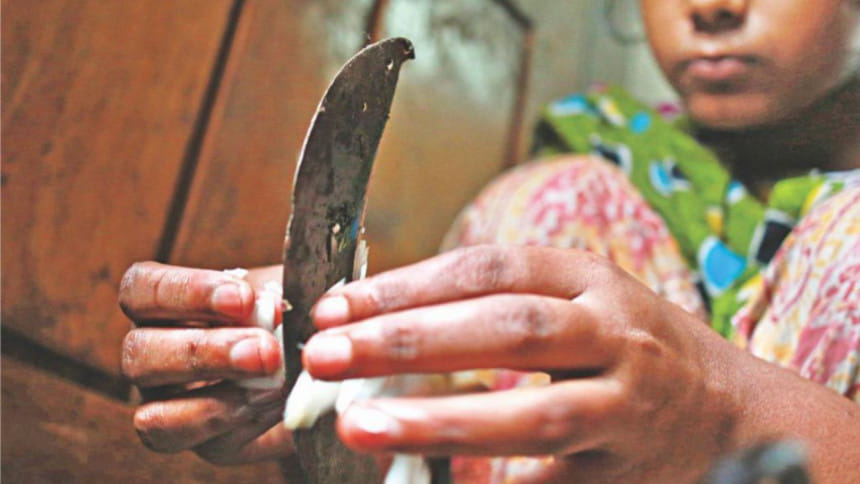Protection of Child Domestic Workers: A policy only on paper

Nearly three years have passed since the Domestic Workers Protection and Welfare Policy was approved by the government. But sadly, we are yet to see any visible impact of the policy on the lives of our more than four lakh domestic workers. Although the amended Labour Law 2013 recognised domestic work as a profession, it falls under the informal sector, meaning that domestic workers would not get certain facilities and benefits that workers in the formal sector are entitled to. The much-talked-about DWPW policy, which was approved in 2015 after years of advocacy and pressure from child rights organisations, now exists only in paper as there has hardly been any progress in terms of its implementation.
According to the ILO-UNICEF baseline survey 2007, the number of domestic workers in the country is 420,000. Among them, 83 percent are female. Another research conducted by BILS has found that 33.6 percent of the domestic workers are children and their age range is from 5 to 14. On average, these children work more than 10 hours a day. Not only that, these children are engaged in many kinds of hazardous work at their workplace, are often physically and mentally tortured by their employers, face sexual harassment, and are sometimes even raped. A recent study has found that 66 percent of the domestic workers suffer mental torture, while seven percent of them are raped.
The Domestic Workers Protection and Welfare Policy, 2015, specified that no children under 12 years of age can be employed as domestic workers at any household and also child domestic workers cannot be engaged in heavy and dangerous work. However, in reality, none of these provisions are implemented.
In the most recent reported case of child domestic worker abuse, Lamia, an 11-year-old was frequently tortured by her employers, Ashraful Islam Chowdhury and his wife Sharmin Akhter, at their house in Barishal. The little girl was kept at her employer's house against her will. She wanted to escape but could not as her employers used to lock her up inside a room. Not only that, her employers used to shave her head so that her hair would not fall on food. She was rescued unconscious by the police, with a bruised face and injury marks all over her body. The brutal torture that was inflicted on Lamia is indescribable. If the DWPW policy was implemented, little Lamia might not have to face such horrors.
Lamia's case reminds one of Sabina and Aduri—both of them were 11 years old when they had to face brutal torture by their employers. All three cases have disturbing similarities: Aduri was found unconscious in a severely malnourished condition near a dustbin in the capital's DOHS Baridhara area in 2013 while Sabina fled her place of employment last year after facing severe torture by her employers. The pictures of both the children with injury marks all over their bodies went viral on social media.
We can only assume that there are countless other incidents of violence against child domestic workers across the country that do not come to our notice. Such incidents are taking place because the policy that we have to protect the rights of (child) domestic workers is rarely implemented, and also because there remain some loopholes in the policy that must be fixed if we want to see any change in the current situation.
Firstly, it is important that domestic workers are registered and their wage is fixed by the government in accordance with the DWPW policy. If there is a government database of the domestic workers and a monitoring mechanism in place, employing underage children at households will be difficult.
Another issue that must be given due importance is fixing a minimum age for admission to domestic work. The minimum age for starting domestic work should be increased to 14 years—currently it is 12 years. Although the Labour Act 2013 (amended) has fixed the minimum age for admission to work at 14 years (and in case of hazardous work, the age for admission to work is 18), sadly it does not apply to domestic workers. In this respect, Bangladesh should ratify the ILO convention 138 which has specific directions in terms of determining the minimum age for work.
Then there is the issue of including domestic work in the list of hazardous works. Article 3 of the ILO convention 182 on the Worst Forms of Child Labour mentions that "work which, by its nature or the circumstances in which it is carried out, is likely to harm the health, safety or morals of children" will be considered hazardous. The National Child Labour Elimination Policy 2010 also clearly states the conditions that will be considered hazardous for children. Some of the conditions are: more than five hours' work per day; work that creates undue pressure on the child worker's physical and psychological health and social status; work in an insecure and unhealthy environment; work without wage or with irregular payment or low wages; work that requires carrying out duties disproportionate to his or her capacity; work in such a condition that hinders his or her education, etc. All these conditions mentioned in NCLEP- 2010 are applicable to our child domestic workers. So, what is holding us back from listing domestic work as hazardous work for children?
Lastly, domestic work should be recognised as a profession in the formal sector. If that can be done, addressing and protecting the rights of the (child) domestic workers will be relatively easy. Because then, domestic work will come under the various regulations and monitoring mechanisms of the government.
If the government can take these policy decisions and also implement the existing policy regarding protecting domestic workers' rights, chances are that we will not have to see any more children like Lamia, Sabina and Aduri suffering in silence across the country.
Naznin Tithi is a member of the editorial team at The Daily Star.





Comments